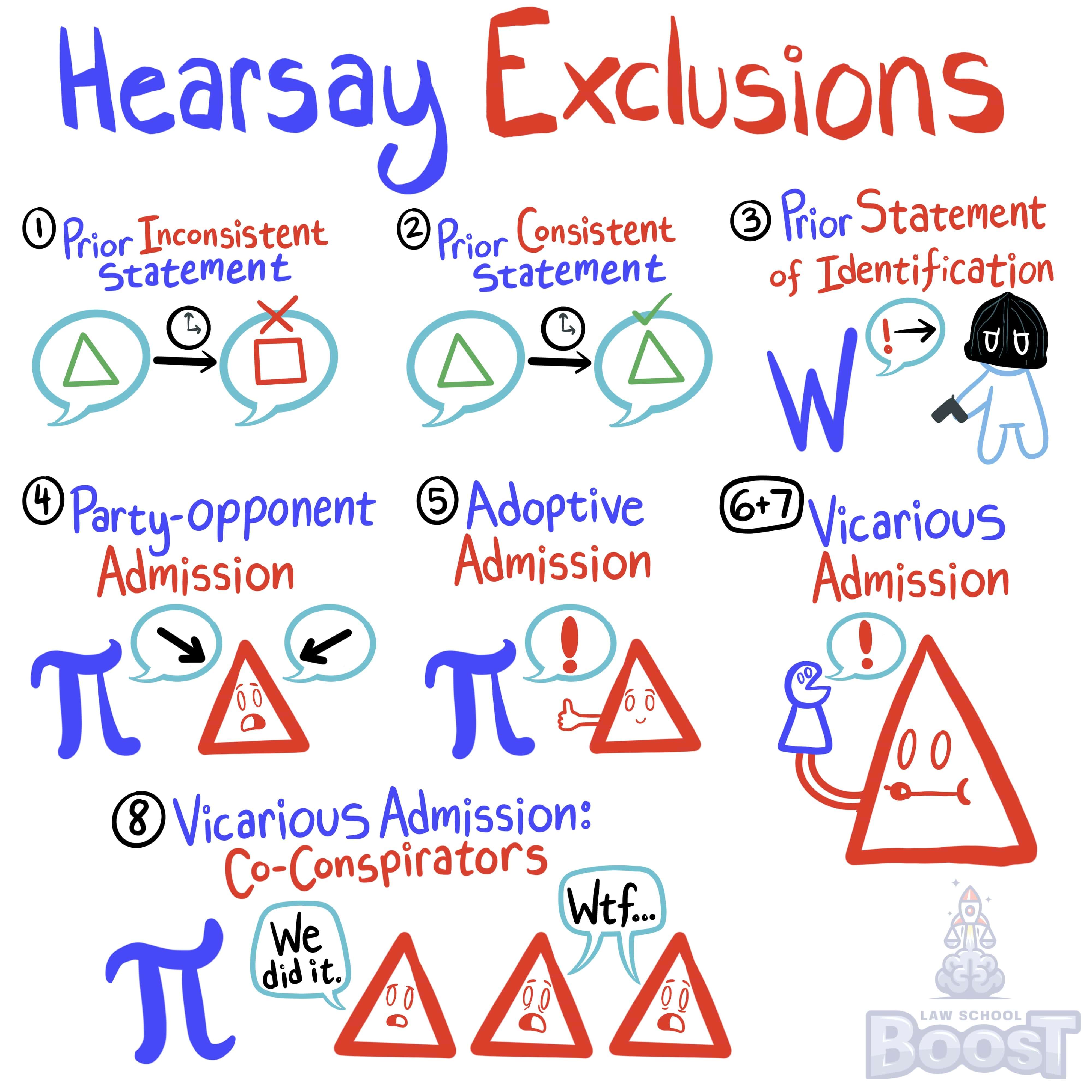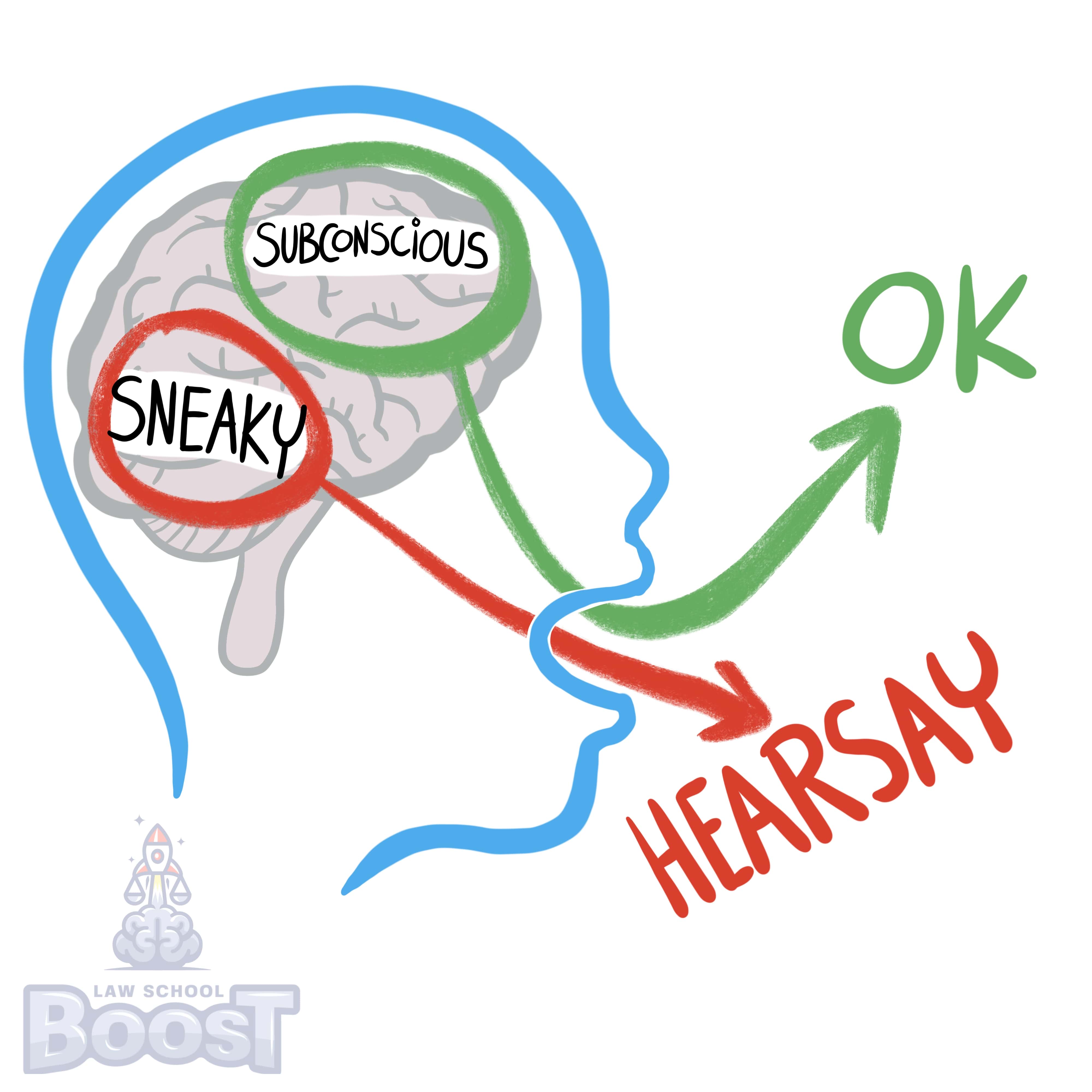🦅
Federal Evidence • Hearsay Exclusions
EVID#027
Legal Definition
An admission by a party opponent is a hearsay exclusion. It is a statement made by a party and offered by an opponent. It need not be against the speaker's interest.
Plain English Explanation
If someone involved in a legal case makes a statement, that statement can be used as evidence against them in the case. This is called an admission by a party opponent. It doesn't matter if the statement hurts their side or not - any relevant statement they make can be used. For example, if someone accused of a crime says something about the incident, that statement can be presented in court as evidence, even if it doesn't directly admit guilt. These statements are allowed in court and are not considered hearsay at all, even though they come from someone other than a witness on the stand. The idea is that a party should be responsible for their own statements in a case against them.
Hypothetical
Hypo 1: Bob and Sam are neighbors disputing over a tree that Sam claims is on his property. During a neighborhood barbecue, Bob jokingly says to another neighbor, "I actually planted that tree on what used to be Sam's land." Sam's lawyer uses this statement in court. Result: Bob's casual admission is used as evidence that he acknowledged planting the tree on Sam's property, supporting Sam's claim of property rights over the land where the tree stands.
Hypo 2: In a contract dispute, Sam sues Bob for not delivering goods as agreed. In an email to another client, Bob mentions he had to delay some orders, including Sam's, because of supply issues. This email is presented in court by Sam's lawyer. Result: Bob's email, where he admits to delaying Sam's order, is used as evidence against him to demonstrate breach of contract, despite it not being a direct communication to Sam.
Hypo 3: During a divorce proceeding, Bob claims he never agreed to give Amy any financial support after their separation. However, during a phone call recorded by Amy, Bob says, "I guess I did tell you I would help out financially for a bit." Amy uses this recording in court. Result: The recording of Bob's statement is admitted as evidence of his agreement to provide financial support, countering his claim in court that he made no such agreement.
Hypo 4: During a contract dispute, Sam is sued by Bob for not delivering goods as agreed. Before the lawsuit, during a business meeting, Bob records Sam saying, "I will make sure all your orders are delivered by next Friday, no matter what it takes." However, Sam fails to deliver the goods by the promised date. During the trial, Bob plays the recording to show that Sam committed to a specific delivery timeline. Result: Sam's statement, although not against his interest at the time and made in a context of ensuring customer satisfaction, is used against him in court as an admission by a party-opponent.
Hypo 2: In a contract dispute, Sam sues Bob for not delivering goods as agreed. In an email to another client, Bob mentions he had to delay some orders, including Sam's, because of supply issues. This email is presented in court by Sam's lawyer. Result: Bob's email, where he admits to delaying Sam's order, is used as evidence against him to demonstrate breach of contract, despite it not being a direct communication to Sam.
Hypo 3: During a divorce proceeding, Bob claims he never agreed to give Amy any financial support after their separation. However, during a phone call recorded by Amy, Bob says, "I guess I did tell you I would help out financially for a bit." Amy uses this recording in court. Result: The recording of Bob's statement is admitted as evidence of his agreement to provide financial support, countering his claim in court that he made no such agreement.
Hypo 4: During a contract dispute, Sam is sued by Bob for not delivering goods as agreed. Before the lawsuit, during a business meeting, Bob records Sam saying, "I will make sure all your orders are delivered by next Friday, no matter what it takes." However, Sam fails to deliver the goods by the promised date. During the trial, Bob plays the recording to show that Sam committed to a specific delivery timeline. Result: Sam's statement, although not against his interest at the time and made in a context of ensuring customer satisfaction, is used against him in court as an admission by a party-opponent.
Visual Aids


Related Concepts
Does California recognize the hearsay exclusion of a vicarious admission from a principal-agent?
How does the prior inconsistent statement hearsay exclusion differ in California?
How does the prior statement of identification hearsay exclusion differ in California?
What is an adoptive admission?
What is a prior consistent statement?
What is a prior inconsistent statement?
What is a prior statement of identification?
What is a vicarious admission from a co-conspirator?
What is a vicarious admission from an authorized spokesperson?
What is a vicarious admission from a principal-agent?


